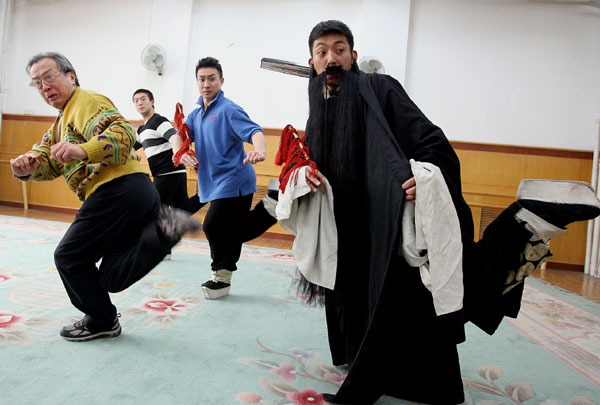Tibet Opera to return to center stage
Updated: 2012-12-28 03:06
By Li Yao (China Daily)
|
||||||||
China's top opera academy will offer an undergraduate course in Tibetan Opera for the first time in 2013.
The National Academy of Chinese Theatre Arts, located in Beijing's Fengtai district, plans to enroll 37 undergraduate students majoring in five regional operas that have been recognized at State or global level as intangible cultural heritage. In addition to Tibetan Opera, the styles include Qinqiang Opera, a 2,000-year-old genre that originated in northwestern China, and Liuzi Opera, which is popular in Shandong, Henan, Jiangsu and Anhui provinces.
 |
|
Students rehearse with their teacher in the National Academy of Chinese Theatre Arts on Dec 20. ZHANG WEI / CHINA DAILY |
Zhou Long, the academy's vice-president in charge of student enrollment, said the school is currently unsure how it will allocate the 37 places among the five genres, but only the best applicants will pass the three rounds of exams, scheduled for the end of February 2013.
The selected candidates will also need to pass the college entrance exam next year, before enrolling at the academy in September 2013.
The school will waive their annual tuition fee of 10,000 yuan ($1,600) for the duration of their four-year studies, with support from Beijing municipal government, Zhou said.
The academy will work closely with regional opera troupes, as most applicants will come with recommendations from their troupes. Once admitted, the students will be instructed in Beijing for two or three years, and spend several semesters in their native province or region to put their new skills into practice, Zhou said. All candidates are expected to have received training since their youth, either at school, in a troupe, or as an apprentice to a master. After they graduate, most will return to their troupe and serve local communities, he said.
The academy is obliged to help revive marginalized operas that used to have great popular appeal. Students will improve their performance skills and understanding of the opera's history and artistic features, Zhou said.
Gesang Choegyal, deputy director of the folk arts institute in the Tibet autonomous region, said he hoped more artists, not merely actors and actresses, will graduate from the academy's program.
Colleges in Tibet, such as the school of arts at Tibet University, have granted undergraduate degrees in Tibetan Opera. Students usually learn by repeating every line sung by the teacher.
More modern methods should be combined with traditional teaching. Students should also know operatic theories, the different schools of Tibetan Opera, and develop their creativity, Gesang Choegyal said.
Students receiving an all-round arts education will make first-rate performers and researchers, both of which are in high demand in Tibet.
Research into Tibetan Opera is limited because only a small number of people focus on this field. Among them, many cannot sing Tibetan Opera, or do not speak the Tibetan language, he said.
Feng Bo, a senior manager at a company running two Tibetan Opera troupes in Lhasa, capital of the autonomous region, said she would be interested in hiring graduates trained at top art schools.
She said the troupes' major audiences are tourists.
The company will soon hire more talent to boost its appeal. Another company in Lhasa is planning performance tours to introduce Tibetan Opera to a wider audience, Feng said.
Yue Weishan, leader of a Liuzi Opera troupe in Jinan, Shandong province, said he looked forward to the joint bachelor's degree program with the academy. He said six students from his troupe will be selected to attend the academy in 2013.
Liuzi Opera has suffered from a serious decline and Yue's troupe, established in 1959, is the only one left in China.
The genre began a slow revival after it was recognized as State-level intangible cultural heritage in 2006. But talent and qualified teachers remain scarce, Yue said.
Students will learn more techniques at the academy and reach larger audiences by performing at the most respected theaters in Beijing, such as the National Center for the Performing Arts and the Meilanfang Theater, he said.
But the program is not all about learning new techniques. Seasoned artists from Yue's troupe will continue to coach the students and ensure the distinct local characteristics of Liuzi Opera are not lost, he said.
Daqiong in Lhasa contributed to this story.
Contact the writer at liyao@chinadaily.com.cn

 Relief reaches isolated village
Relief reaches isolated village
 Rainfall poses new threats to quake-hit region
Rainfall poses new threats to quake-hit region
 Funerals begin for Boston bombing victims
Funerals begin for Boston bombing victims
 Quake takeaway from China's Air Force
Quake takeaway from China's Air Force
 Obama celebrates young inventors at science fair
Obama celebrates young inventors at science fair
 Earth Day marked around the world
Earth Day marked around the world
 Volunteer team helping students find sense of normalcy
Volunteer team helping students find sense of normalcy
 Ethnic groups quick to join rescue efforts
Ethnic groups quick to join rescue efforts
Most Viewed
Editor's Picks

|

|

|

|

|

|
Today's Top News
Health new priority for quake zone
Xi meets US top military officer
Japan's boats driven out of Diaoyu
China mulls online shopping legislation
Bird flu death toll rises to 22
Putin appoints new ambassador to China
Japanese ships blocked from Diaoyu Islands
Inspired by Guan, more Chinese pick up golf
US Weekly

|

|







